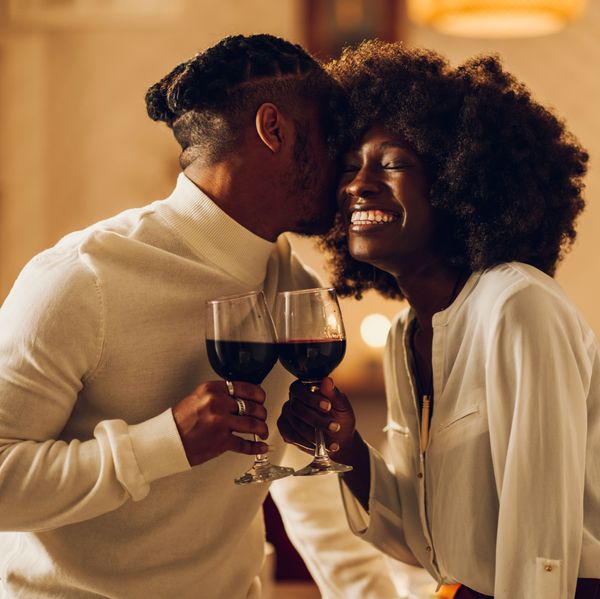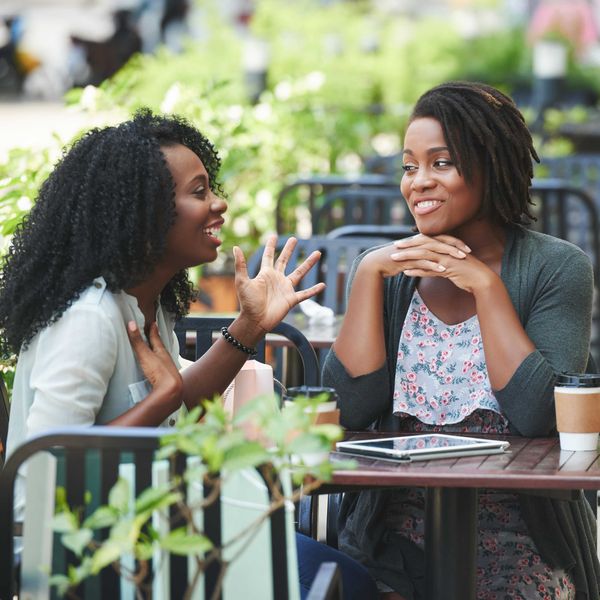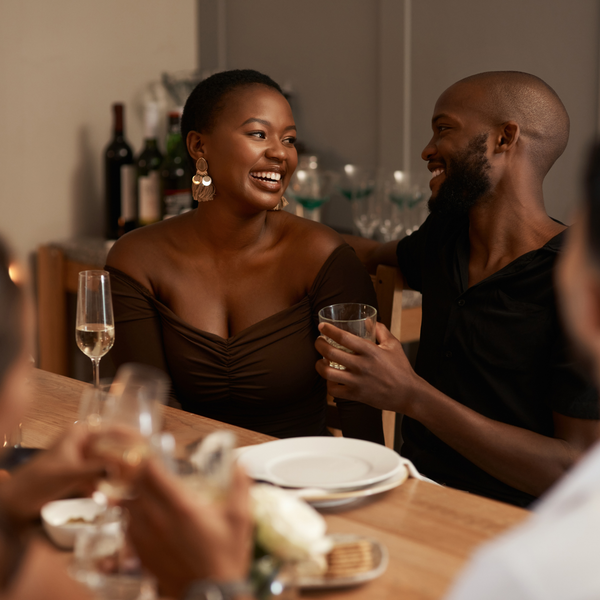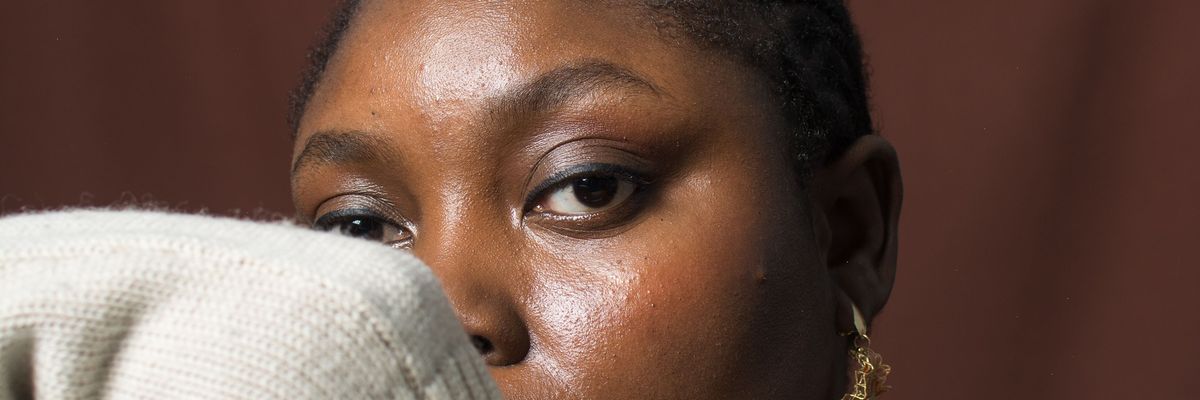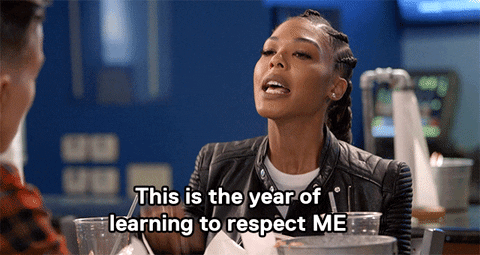
I'm absolutely not, in any shape, form or fashion, a Trump fan. Never have been. Adding to that, I give major side-eye to anyone who is, including the evangelicals who claim he is doing "the Lord's work". Shoot, you can walk on over to Isaiah 1:17(NKJV) and read, "Learn to do good; seek justice, rebuke the oppressor; defend the fatherless, plead for the widow" and then line that up with Matthew 12:33 ("a tree is known by its fruit") and see that him doing the kind of work that God would be proud of is super suspect (to put it mildly). But when someone recently asked me about what I personally think is the worst thing that Trump has done to this country—so far, anyway—although the list is LONG, I chose to mention something that I feel is very underrated—"Trump has made a lot of Americans more insecure, unbelievably hypersensitive, extremely narcissistic and, well, bullies."
If you've even spent a day trying to stomach all of the president's "Trump yells" (I call his tweets that because about 90-95 percent of them end up with exclamation points), you'll see that he is quite the tyrant. So long as someone agrees with him, it's all good. Oh, but as soon as someone doesn't? Well, he pulls stunts like the title of this article—"White House to Federal Agencies: Cancel New York Times and Washington Post Subscriptions". If you don't agree with, like or condone what he has to say, you should be silenced. Tell me that's not the same energy that you see on social media, at your place of employment, and perhaps even across from your own dinner table on a regular basis. If you agree with me, cool. If you don't, STFU.
This one article isn't going to totally change our climate. I know that. But when I recently read that the hip-hop artist Nas has grown weary of how much we refer to Illmatic as being his best work, I thought about one of my own personal faves that isn't featured on that classic project. The song is "One Mic".
In response to a culture that seems to be getting more infected with the combo of fear and ego by the day, I just want to take a moment to use my one voice to say 1) you have the right to have the views that you do and 2) you can do that while still respecting the views of others, even though others may not be doing it in return. Here's how.
Implement the Golden Rule
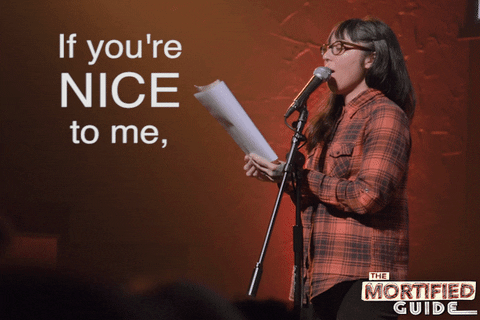
One of my first writing gigs gave me the opportunity to interview one of the most real and pleasant artists I've met to this day—Amel Larrieux. One of the things that we talked about is although she considered herself to be far more spiritual than religious, a biblical principle that she did make a point to instill into her children was the Golden Rule—"Do unto others as you would have them do unto you." (Although it's phrased a bit differently, the basic principle is found in Matthew 7:12). She said it is one of the best ways for all of us to be more loving and tolerant. Amen.
I remember once hearing that the way we treat others, it tends to speak volumes about how we feel about ourselves. That said, ain't it a trip how folks will profess their views and feelings on something and then, once you say something contrary, not only are you wrong, but some people will cuss you out, tell you how much of a hater that you are, and then, they will try and intimidate you into not sharing your perspective ever again? Oh, but let that same person be treated in the way that they treated you and suddenly, they are a victim.
Some things are a matter of flat-out right or wrong. No doubt about it. But a billion more things are based on opinion and perspective. For those matters, when you make a point to respond in the way that you would want someone to respond to you (hopefully that is a kind, thoughtful and non-threatening manner), it's amazing how much they are willing to hear you out. And when there are less monologues and more dialogues transpiring, it's kind of amazin', how much growth can happen—between both individuals.
Always Keep People’s Personal Paths in Mind
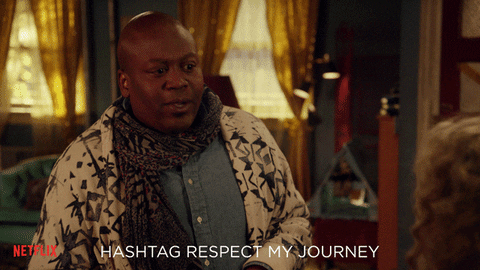
I am the kind of person who is far more interested in the "root" of a person than their actual "tree". What I mean by that is, all of us have paths and experiences that result in who we are today. So, whenever I encounter someone who couldn't be more different than I am when it comes to their views, philosophy or even lifestyle, I like to know what brought them to their particular point and place. I also encourage them to listen to some of what got me to where I am as well.
For instance, I recently had a conversation with someone about marriage and divorce. When I shared some of my views and they immediately told me how wrong and "crazy" I was, I calmly asked, "So, you're basically telling me that the Bible is wrong because that is where I'm pulling my convictions from. And if you are, if you're telling me to concede to you rather than stand on what I believe is wrong, isn't that a form of idolatry? Isn't that placing your over my own values and principles?" It was crickets after that.
It wasn't my job to try and make others see things my way. It didn't need to be their job to make me submit to theirs either. At the same time, we've all heard the saying, "Seek first to understand, then be understood." One of the best and most effective ways to respect someone's path that is unlike your own is to do just that. To not cause "accidents" by always trying to force other folks "into your lane". And yes, y'all, that goes both ways.
Gut Check Your Own Confidence and Security Levels
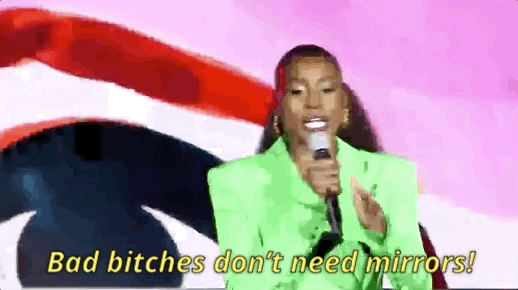
I'm not on social media. I haven't been for almost a decade now, and while I'll pull a Brandy and "Never Say Never" about not coming back on, I can tell y'all that I am at perfect peace being without it. Although I must say that, back in my Facebook days, it was pretty lit because it was basically a social commentary page. I would post stuff, encourage comments and, one of my rules was that I never pulled comments off—no matter how much I disagreed or even if I was attacked for my own statements. Sometimes things would get so heated that people would get mad, block me and then talk about me on their page. Still, most times, it was hard to get mad because I was kind of like, "I mean, if you are so firm in your beliefs, why are you so threatened by mine?"
All these years later, I still feel that way. Whenever I do get triggered by someone else's perspectives or opinions, the first thing that I try and do is get to the root of why it bothers me so much. More times than not, it's either due to how they presented their perspective, because they are trolling (trolling really is the absolute worst) or, it's because their words challenged me to push past myself and dig deeper—whether I liked it or not.
If you're someone who seems to always be mad when someone thinks or says something that is contrary to how you feel, take a moment to reflect on why it's got you so heated. You might realize that it has very little to do with them and more to do with your own sense of confidence and security levels. Especially when it comes to folks in cyberspace who you don't know and probably will never see. Because really, why should they affect you so profoundly? Unless they've got a point that you weren't prepared to consider and that's got you totally out of your comfort zone. #hmm
Don’t Let the Influence of Fame Make You a Hypocrite. Or a Bully.

Again, because the world is on-10 when it comes to hypersensitivity, I'll leave specific names and particulars out. But over the past few months, I have seen celebrities get caught doing the very thing that they berate others about. They will talk about folks but once they are discussed, now there's a crusade to silence their critics. Or, they will tell others about the kinds of folks they should and should not be friends with based on their friend's political or religious views, but the very moment they are seen with someone who is just like the individuals they preach against, suddenly it's all about empathy. Not only is taking this kind of approach majorly hypocritical, it can also be the trait of a bully.
Why do I say that? In a nutshell, bullies are "a blustering, quarrelsome, overbearing person who habitually badgers and intimidates smaller or weaker people". I also say that because of what the traits of a bully consists of—always needing to control and dominate other people; being quick to pop-off on others; being intolerant of the differences of other people; having a poor sense of impulse control, and having a sense of inferiority. This is a bully, y'all. How often do you see this acted out on a daily basis? When people are out here trying to convert folks into believing just like they do or cancel them when they don't, how many bullying tactics are tied into that? Voltaire once said, "If you want to know who controls you, look at who you are not allowed to criticize." Or even think differently than. Folks who try and control others? They are bullies.
The reason why celebrity culture is able to bully so effectively is not really because of their power, but how a lot of us see ourselves; it's because a lot of us "elevate" them when they really should be no more than appreciated. Maybe sometimes admired.
I recently watched a video on hip-hop artist Lecrae's YouTube channel and he brought up a good point. At the end of the day, even after all of the awards and money, "You're still gonna be a person who has death in your family, still gonna have insecurities, still gonna be tired, still gonna be hungry…all I'm trying to say people is work hard and do it out of love." Right.
People are just people. So, don't allow the influence of famous folks to have you out here being a hypocrite or a bully to others. Don't try and push points on people that you are not applying yourself and don't try and intimidate others into feeling like they are smaller or weaker than you are, simply because they are different. To do either of these things, it is the epitome of being disrespectful.
Stop Trying to “Convert” Others. Don't Be Obsessed with "Cancelling" Them Either.
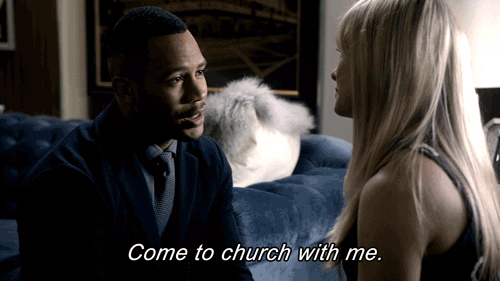
Something that inspired me to pen this piece was a tweet that I saw not too long ago. Someone tweeted out that a celebrity was recently praised for how quickly she lost weight following her pregnancy. The person wasn't congratulating that individual, though. What they immediately said after was when we praise someone for losing weight, what we're actually doing is fat-shaming. They made sure that it was written in all caps too. Brother.
That might sound ridiculous, straight out of the gate, but let that way of thinking get repeated in the press for a month straight and you might be surprised by just how many other folks will end up jumping on the bandwagon. While that tweeter thought that they were making some profound point, really with all of that yelling (because that's basically what writing in all caps conveys) and trying to silence people who disagreed were doing was trying to convert others. Then, if they could make that happen, they would probably say that those who disagreed should be cancelled.
Have you ever looked up the definitions of convert and cancel? To convert is "to turn to another or a particular use or purpose; divert from the original or intended use". To cancel is "to make void; revoke; annul". When a view or perspective is abusive or putting someone in harm's way, that is one thing. But all of us are individuals. This means that all of us are unique. We have different purposes. Should this reality be revoked or annulled simply because it doesn't match another's?
I'm a Bible follower. No doubt about it and I offer no apologies for it. But I also have people I adore who come from totally different religions and opinions. They don't try and convert me. I don't try and cancel them. Where we find common ground, cool. Where we don't? We try and respect that we don't because they are them and I am me. It's beautiful how much peace can be maintained, just with this point alone. This brings me to my final suggestion.
Know What It Truly Means to Agree to Disagree. Then Do It.
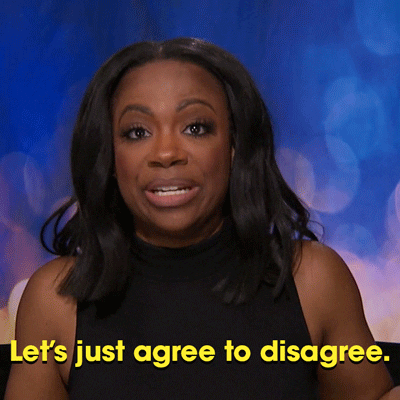
We've all heard the phrase "agree to disagree" before, but what actually does it mean? In a nutshell, it's when two opposing parties decide to "cease fire" in the sense of no longer arguing over a particular point. Some people might see this as a passive aggressive approach to matters, but c'mon—we all know there are some things that two people are never going to see eye to eye on. The thing that we need to ask ourselves is, "Why is that such a problem?"
One of my clients? They couldn't be more opposite of me on the political tip. They have actually said some things that I know would get them blocked on social media by some of my friends. But I get that they are the way that they are via their own life journey; that a lot of what they think isn't "bad", it's just not what I'm on. I must admit that we had one political debate that ended up being more draining more than anything because it wasn't like there was a prize at the end of the discussion. After that lil' chat, I said to them, "There are so many other things that we see in similar ways. Let's not let politics get us in that space again."
It's not that I'm afraid of confrontation. Anyone who knows me can certainly vouch for that. It's just that time—and hopefully wisdom—are teaching me that agreeing to disagree oftentimes translates into "don't sweat the small stuff". When you value your peace, your relationships and the time that you will never get back, you begin to accept that one way to honor others, and yourself, is to agree to disagree; to be OK with the reality that not everyone is like you. To have your say, to allow them to do the same, and to sometimes, simply leave it at that.
I'm learning more and more to do that because, well, it's the respectful thing to do, and you can never go wrong with respect—or self-respect. In a world that is getting further away from embracing this fact, never lose sight of it because, as a freelancer by the name of Annie Gottlieb once said, "Respect is appreciation of the separateness of the other person, of the ways in which he or she is unique."
We're not supposed to be clones of one another. Our differences are what helps us all to grow and evolve into better beings.
Give the same kind of respect you want to receive. Watch how much better the quality of your life becomes because of it. That's not a hunch. It's a guarantee.
Did you know that xoNecole has a podcast? Subscribe on Apple Podcasts or Spotify to join us for weekly convos over cocktails (without the early morning hangover.)
Want more stories like this? Sign up for our newsletter here and check out the related reads below:
How To Stop Being A People-Pleaser & Start Doing You
Social Media: How To Take Back Control Of What You're Consuming
Here's How To Know You're At Total Peace With Yourself
Why Taking A Break From Social Media Is Critical For My Self-Care Routine
Feature image by Giphy
- 15 Ways To Respect A Person's Opinion ›
- 5 Ways to (Respectfully) Disagree (for Teens) - KidsHealth ›
- Respect Tip: Seek Someone Else's Opinion ›
- Why should we respect someone else's opinion if they don't respect ... ›
- Respecting Other People's Opinions: Encourage Dialogue, Not ... ›
- What is the importance of respecting someone else's opinion? - Quora ›
Your December 2025 Monthly Horoscopes Are All About Surrender & Alignment
December is about letting go. We end the year with the need for more peace, reflection, and rejuvenation, and that is exactly what December is providing for us. The Sun is in Sagittarius, and anything is possible. This is the month to believe in that and to know that the universe is supporting you. With a Supermoon in Gemini as we begin the month as well, we have an opportunity to gain the closure we have been looking for this year and to wrap up old projects, ideas, and communication breakthroughs.
This is the month to make your peace the priority and let go of trying to control the way the tides are turning. Trust in your new beginning, and give yourself time to prepare for it this month.
A big part of the clarity that is coming through this month is due to Neptune going direct in Pisces on December 10, after being retrograde here since July. With Neptune now direct, we are able to see our inspiration and creativity a little more clearly, providing the perfect energy for dreams and manifestation to be built upon. The smoke is clearing, and it’s up to you to decide what you want to do with this newfound clarity that this transit is bringing. Mercury also moves back into Sagittarius on December 11, which is great for communication and clarity, and the adventures you were trying to see through at the beginning of November come around for you again with greater purpose and support.
On December 15, Mars enters Capricorn until the end of January 2026, and this is the extra push we need to make important changes and to be on the path towards greater abundance, stability, and prosperity. Mars in Capricorn takes care of business, and we have extra energy at our disposal during this time to do so. This transit is an ideal time to focus on your career or financial goals for next year and to start putting some of these plans into motion now. A few days later, we have the New Moon of the month, which will be in Sagittarius on December 19, and this is the perfect New Moon to manifest.
The energy is high, magic is in the air, and it’s all about moving forward with the new beginnings that are inspiring you and bringing you joy to think about right now.
Capricorn Season officially begins on December 21, and this earth sign energy is how we heal, gain closure, and build new foundations in our world. With Venus also moving into a Capricorn a few days later, there is something about peace, prosperity, and security that we are gaining in life and in love as we close out the year, and this is what we need right now. This month is about reflecting on what was, letting go of old hurt, and renewing. December is an ending and a new beginning in one, and there is magic in this space to be created.
Read for your sun and rising sign below to see what December 2025 has in store for you.
 AriesKyra Jay for xoNecole
AriesKyra Jay for xoNecoleARIES
December is a full-circle moment for you, Aries. You are seeing the gifts in your world and have a lot of gratitude for the way things have come about for you as of late. There are culminations in your world that are providing you with more abundance, stability, and community, and you are exactly where you are meant to be this month. With the Sun in a fellow fire sign and in your 9th house of travel for most of the month, December is a good time to get out of your comfort zone, explore the world around you, and get your body moving.
Mars, your ruling planet, also makes a change and moves into Capricorn on December 15, which will fuel your inspiration and power in your career space. You are making a lot of professional progress as we close out the year; however, make sure to be more mindful of your competitive drive right now. The New Moon on December 19 is the perfect opportunity for you to create some new plans and goals when it comes to traveling, education, and where you want to gain some new inspiration in your world. Overall, this is a month of things coming together for you serendipitously.
 TaurusKyra Jay for xoNecole
TaurusKyra Jay for xoNecoleTAURUS
December is about trusting your intuition, Taurus. You have a lot on your mind this month, and it’s best to delegate, communicate, and allow yourself some relief by opening up to someone and not feeling like you have to hold everything in. As we begin the month, we have a Supermoon in Gemini happening in your house of income, and the plans and projects you have been building here come to fruition for you now. This is the time to gain clarity on your financial world and to take a look at what spending habits you want to let go of here as well.
With Venus in your 8th house of shared resources for most of the month, you are doing a cleanse on your commitments, partnerships, and business ventures. You are taking a look at what you want to dedicate yourself to in the future, and what commitments you may need to let go of now in order to be in the space you truly want to be, both financially and within some of your relationship dynamics. Before we end the month, we have a New Moon in this same area of your chart, and it’s time to look at the opportunities that are presenting themselves and to trust your internal guidance system to lead you forward.
 GeminiKyra Jay for xoNecole
GeminiKyra Jay for xoNecoleGEMINI
You are moving forward fearlessly this month, Gemini. December is your month of love, passion, and dignity, and you are owning the light that you shine. We begin the month with the last Supermoon of the year, happening in your sign, and you are stepping up to the plate. You are showing up, owning how much you have grown this year, and allowing yourself to heal while also acknowledging that you have done your best and you deserve to have fun in the midst of the changes you are creating.
Mercury, your ruling planet, is officially out of retrograde, and you can use this energy to the fullest potential now. With Mercury in your 7th house of love, it’s time to speak from the heart and to talk about the things that matter and that are inspiring you right now to your loved ones. You never know what kind of epiphanies you may have when you open up the conversation to others. Before the month ends, you have a New Moon in this same love area of your chart, and this New Moon is all about manifesting romance, commitment, and abundance in your world.
 CancerKyra Jay for xoNecole
CancerKyra Jay for xoNecoleCANCER
December is an opening for more love, more joy, and more freedom in your life, Cancer. You have come to a place where you hold so much gratitude in your heart for where you are today and where your heart is shining, and things come together for you with more ease right now. With the Sun in your 6th house of health, work, and daily routines for most of the month, you are getting your ducks in a row while also putting more energy and effort into taking care of yourself, your priorities, and your well-being. This month surprises you in many ways, and it’s because you are showing up.
Mars and Venus both move into your house of love, relationships, marriage, and abundance this month, and you are making strides in your love life. You have both of these opposing forces on your side and are being recognized for the love you are while also receiving the love you want. This month, overall, is about focusing more on the positives in your world and letting your heart have its joy. Before December comes to an end, there is a New Moon in Sagittarius, and this is the perfect opportunity to create the plans you want to see through next year, especially when it comes to your work life, colleagues, business ventures, and health.
 LeoKyra Jay for xoNecole
LeoKyra Jay for xoNecoleLEO
The scales of karma are balancing, and they are balancing in your favor this month, Leo. December is your month of truth, and of seeing it clearly in your world. The Sun is in your house of romance, pleasure, and happiness for most of the month, and it’s time to relax, be in the present moment, and allow what is meant to be, to be. With a Supermoon in your 11th house of manifestation as December begins, this is a powerful month for seeing your dreams come to fruition, and for feeling like the intentions you have set this year are finally here for you now.
Mars also moves into your 6th house mid-month, and this is the perfect energy to have to move into the new year. You have extra energy at your disposal right now and are feeling fearless with what is possible for you and your daily routine. Before the month ends, we also have a New Moon in a fellow fire sign, Sagittarius, and this is a breakthrough moment for you and your heart. December, overall, wants to show you how loved and supported you are and will be doing so in magical, unexpected, and concrete ways.
 VirgoKyra Jay for xoNecole
VirgoKyra Jay for xoNecoleVIRGO
December is a month of victory, Virgo. You are showing up and experiencing some new successes in your world that move you forward on your path in life. With a Supermoon in your 10th house of career as we begin the month, the effort and intentions you have made this year come into full bloom, and you are being recognized for who you are and the good work you have done. This month is all about showing up and allowing yourself to be seen and loved, knowing that you deserve the support and opportunities you are receiving.
Mars moves into Capricorn on December 15, which brings the passion and excitement into your love life, hobbies, and little pleasures in life that light you up. You want to have fun this month and are going to be walking into the new year with this fearless, happy, and spontaneous energy within you. Before the month ends, Venus also enters Capricorn, and in this same area of your chart, you have a lot to look forward to and believe in right now. Overall, December wants you to be happy and will be doing everything possible to make that happen for you. This is your month to shine, Virgo.
 LibraKyra Jay for xoNecole
LibraKyra Jay for xoNecoleLIBRA
December is a month of opportunity for you, Libra. New doors open, and you are financially making breakthroughs this month because of it. December begins with a Supermoon in your 9th house, and you are getting a clearer view of where you have been making strides in your life and how it has all brought you here to this present moment of freedom. This month is showing you what happens when you are fearless with your purpose and when you believe in yourself and what you are worthy of.
Moving further into December, Mars moves into your 4th house of home and family mid-month, and you are closing out the year in your safe spaces. You are spending more time with your loved ones and taking the time to quiet your mind and listen to what your heart has been telling you. Before the month ends, we have a New Moon in Sagittarius, happening in an area of your life that deals with communication. This is a great time for getting the answers you have been looking for and for feeling more clear-headed and confident about the decisions you are making as you move into the new year.
 ScorpioKyra Jay for xoNecole
ScorpioKyra Jay for xoNecoleSCORPIO
Patience is a virtue this month, Scorpio. December is all about remaining patient and vigilant with what you are creating in your world, and knowing that the universe has your back. It’s time to be reminded of the power of hope, and this month is an opening to greater clarity in your life. There is a lot of energy in your financial zones right now, and this is providing you with new opportunities and new insight; however, the speed at which things come about for you may feel daunting. Keep your head up and eyes focused on what you want and know that you are more than worthy of receiving it.
With Mercury in your 2nd house of income this month, December is a good time to plant new seeds and to think about where you want to be financially a month from now or even a year. This month is asking you to think bigger and to think more long-term so that you can set the appropriate plans into motion now. We also have a New Moon in your house of income before the month ends, and this is when you will see more of your dreams come to fruition in this area of your life, and have more opportunities to build. Overall, December will be teaching you a lot, Scorpio.
 SagittariusKyra Jay for xoNecole
SagittariusKyra Jay for xoNecoleSAGITTARIUS
Sagittarius Season is here, and there is a lot in store for you this month, Sag. December is all about what you are dedicating yourself to. It’s about setting your intentions and putting the work in to back up your dreams, and about getting things in order so that when the new beginnings come, you are ready for them. The Sun and Venus are in your sign for most of this month, and there are a lot of eyes on you right now. You have the potential to create a new beginning for yourself, and it’s time to invest in yourself, your love life, and your dreams.
Mercury moves into Sagittarius on December 11, and this is giving you another opportunity to see through some of the plans that you had initiated in November. Mercury was retrograde in your sign last month, and there may have been some disruptions to your vision and plans for the future, and now this energy is turning around for you. Before the month ends, we also have a New Moon in Sagittarius, and you are walking through new doors fearlessly. You are catching others by surprise by your growth this month, and you are thinking a lot about your purpose, future, and plans for the new year.
 CapricornKyra Jay for xoNecole
CapricornKyra Jay for xoNecoleCAPRICORN
December is all about the vision, Capricorn. You are moving through a lot of changes and transformations this month, yet they are giving you a chance at a new beginning in the process. You are focused more on the future and what goals you want to manifest for yourself right now, and are ready to let go of what hasn’t been working for you. With the Sun in your 12th house of closure for most of December, this is your time for healing, but remember, healing doesn’t have to be isolating or boring; you can thrive while you renew, and you are this month.
Mid-month, the excitement picks up for you, and you are feeling more energized than you have in a while. Mars moves into Capricorn until the end of January 2026, and you are being proactive with your goals, intentions, and passions. You are a force to be reckoned with this month, and you are making things happen for yourself with confidence. Capricorn Season officially begins on December 21 this year, and this is definitely speeding up your healing process. You are breaking free from what was, and with Venus also moving into Capricorn before the month ends, you are leaving this year in high spirits and with love opening a new door for you.
 AquariusKyra Jay for xoNecole
AquariusKyra Jay for xoNecoleAQUARIUS
December is all about community, creativity, and manifestation, Aquarius. This is the month to work together with others to help bring your dreams to life. You are in a space of inspiration, empowerment, and beauty, and are creating more of this energy around you and in your world. Look out for what support comes your way this month and know that you don’t have to do everything alone to succeed. With the Sun in your 11th house of manifestation and friendship, your intentions are coming to fruition, and it’s time to celebrate with the people you love and to own how far you have come this year.
On December 19, we have a New Moon in Sagittarius, lighting up your life in all of the best ways possible. This is your New Moon of freedom, victory, and magic, and you are seeing new beginnings appear that you were once just hoping for. Before the month comes to an end, Venus moves into your 12th house of closure, and after an active and successful month, you are ready to relax, heal, and give your heart some of the attention it has been asking for. You are moving into the new year with the need to release and renew what hasn’t been working in your relationships, and you are finally ready to.
 PiscesKyra Jay for xoNecole
PiscesKyra Jay for xoNecolePISCES
December is a big month for you, Pisces. You are making some huge accomplishments this month, and are feeling like everything you have been through this year has been worth it for these moments that are coming to fruition for you now. The Sun is in your 10th house of career and reputation for most of the month, and this is where a lot of your focus is right now. You are claiming your successes and putting yourself out there in ways that not only serve you, but that inspire others as well.
Neptune officially goes direct on December 10, after being retrograde in your sign since July, and you are finally seeing things a little more clearly. You are feeling renewed inspiration and passion in your life, and your intuition is your strongest asset right now. Before December comes to an end, we also have a New Moon in your 10th house of career, and what happens now not only changes things for you in the present, but it also opens new doors and what is possible for you in the new year as well. Overall, you are on top of your game this month and are owning the joy and empowerment you feel.
Featured image by Kyra Jay for xoNecole
Skincare Hacks That Actually Make Hyperpigmentation...Worse
Something that I wish I had learned back when I was experiencing more breakouts than I do at this point in my life is the difference between hyperpigmentation and actual acne scars. Although people oftentimes believe that they are one in the same, that actually isn’t the case.
Yes, both can result in darker marks on your skin; however, while hyperpigmentation can change the color of it, scars often also alter your skin’s texture. And yes, it’s important to know the difference between the two because, that way, you know how to treat each issue.
Since the focus today is on hyperpigmentation, let me break that down a bit further. Basically, what gives your skin pigment is melanin. Well, when your skin cells end up getting damaged or injured, oftentimes your body’s response is to create more melanin as a part of the healing process. Problem is, sometimes your system overproduces melanin, and that can lead to darker patches of skin. This can especially be the case for our skin since we naturally produce more melanin anyway.
When hyperpigmentation transpires, we usually want to get rid of it as soon as possible. And while doing things like applying sunscreen, using skin lightening products, and even taking certain vitamins can help — the main thing to do is incorporate a gentle skincare regimen and then use patience with it. If you don’t and you go overboard in your approach, you could look up and end up with hyperpigmentation issues that are far worse (and longer lasting) than they were to begin with.
How? I’ll explain.
Using Products That Create Breakouts
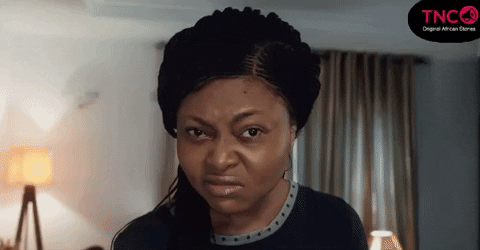 Giphy
GiphyWho likes getting a pimple? For me, though, what pisses me off to no end is that there is about a 70 percent chance that if one pops up, some sort of hyperpigmentation is going to be left behind whether I mess with it or not. Ugh. The reason why is because zits bring inflammation and inflammation can trigger hyperpigmentation.
So, you know what that means, right? It’s important to do all that you can to avoid getting a pimple in the first place and that includes not using products that will clog up your pores or irritate your skin like lanolin, thick butters (especially on your face), mineral oil, D&C coloring, a fatty acid called isopropyl palmitate — these are a few things that can lead to breakouts, if you’re not careful. That’s why it’s always a good idea to read the labels of the things before purchasing them.
Oh, and when it comes to things like shea and mango butter, it’s usually best to use them on other parts of your body than your face (because your face is more fragile than, say, your arms or legs).
Doing Too Much Exfoliating
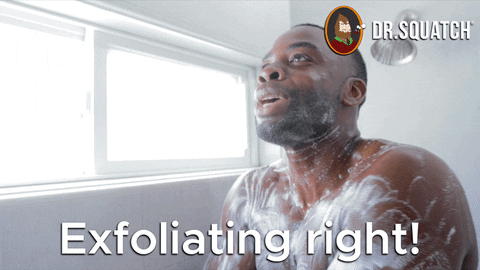 Giphy
GiphyI am a fan of DIY chemical peels; so much so that I wrote an entire article about it a couple of years ago (check out “I've Been Doing At-Home Chemical Peels. Here Are The Pros And Cons.”). The things that I like most about them are they are a super-effective way to exfoliate and even out my skin tone. That said, though, be careful with doing too much exfoliating whether it’s via a chemical peel, a skin scrub or even dry brushing.
Not only can over-exfoliating irritate your skin, it can dry it out, cause lots of skin flakes, lead to inflamed skin — and all of this can result in hyperpigmentation as your skin is in the process of “getting back to normal.” So, just how often should you exfoliate? Unless your skin is really oily, 1-2 times a week is more than enough (2-3 if it is on the oily side).
Layering with Too Many Products
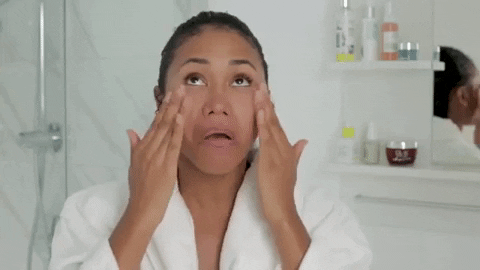 Giphy
GiphyOh, I know — if you watch too many of those TikTok and Instagram videos where women are applying 6-10 products on their face before adding any make-up to it, it can tempt you to follow suit. Use some caution with that, though. Each skincare product comes with its own list of ingredients and every time you add something else that has another set of ingredients onto it, that increases the chances of you irritating your skin or causing it to break out.
My two cents would be to ease into each product. Start with one thing and, if it’s all good (after about a week or so), incorporate another. Oh, and try to keep it down to 3-5 skincare products tops. When it comes to effective skin routines “less is more” is a motto to live by. Otherwise, redness, flaking and hyperpigmentation may be in your future.
Using Skincare Products That Contain Fragrance
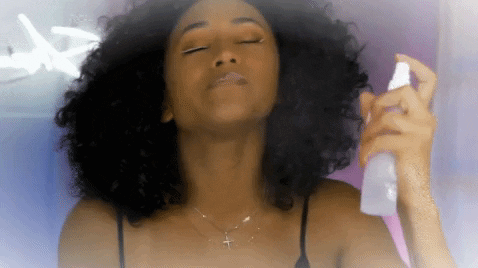 Giphy
GiphyAlthough applying skincare products that have a nice scent to them can cause your skin to smell amazing, sometimes they can be both an irritant as well as an allergen — and that can cause your skin’s barrier to weaken or become really irritated. And again, whenever your skin is damaged in some way, the recovery process can lead to hyperpigmentation. So, it really is best to avoid scented skin products at all costs (if you want flawless skin, that is).
Applying Too Much Heat
 Giphy
GiphyBet you didn’t see this one coming. How about increased blood flow, over time, can lead to hyperpigmentation. Basically, it’s because of the fact that, sometimes, too much consistent blood flow can result in skin inflammation and, as we already discussed, when the body is healing from inflammation, that can sometimes cause hyperpigmentation to occur.
The takeaway here: use sunscreen when you’re outdoors and try to keep those scorching hot showers to a minimum. Being in warm water for between 7-10 minutes is ideal.
Not Testing Products (Especially Acids) on Your Arm First
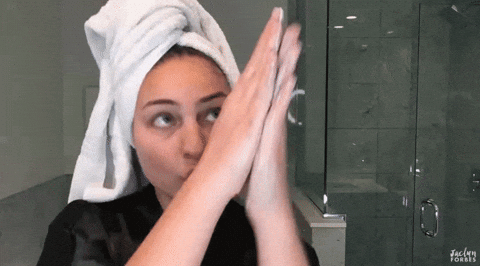 Giphy
GiphySomething that definitely keeps my skin glowing is certain acids: hyaluronic acid, mandelic acid and kojic acid soap (oh and some vitamin C extract too), especially. All of these are pretty good on darker skin tones; however, because we all are different, before applying any acid to your skin, make sure to test it on your arm first (and wait 48 hours, just to be sure that the coast is clear).
Trust me, I know of what I speak because I once tried some pretty potent pineapple extract on my face once and it mildly burned the lower part of my right cheek to the point where it took about four months before everything turned back to normal. Hmph, if I can keep anyone from experiencing that drama, I absolutely will.
7. Experimenting with Harsh Essential Oils
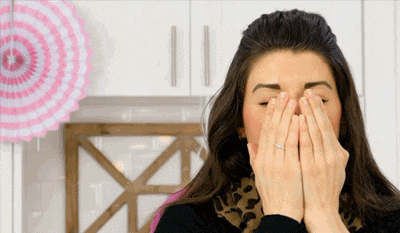 Giphy
GiphyListen, if you want a zit to go away, damn near overnight, apply some tea tree oil to it. Just make sure that you dilute it with a light carrier oil (like grapeseed, jojoba or rosehip oil) first. Why? Oh, I have learned from very up close and personal experience that certain essential oils can also burn your skin and, as we’ve already discussed, ad nauseum at this point, damaged skin typically results in hyperpigmentation on some level. Yeah, essential oils are a blessing. They are also nothing to play with. Dilute, dilute, DILUTE.
___
You know, they say that it can take several weeks, if not many months, for hyperpigmentation to totally fade away. Hmph. To me, that’s even more incentive to do all that you can to avoid it transpiring in the first place — and that includes NOT incorporating counterproductive skincare routines and regimens.
The more you know, sis. For real.
Let’s make things inbox official! Sign up for the xoNecole newsletter for love, wellness, career, and exclusive content delivered straight to your inbox.
Featured image by Shutterstock





